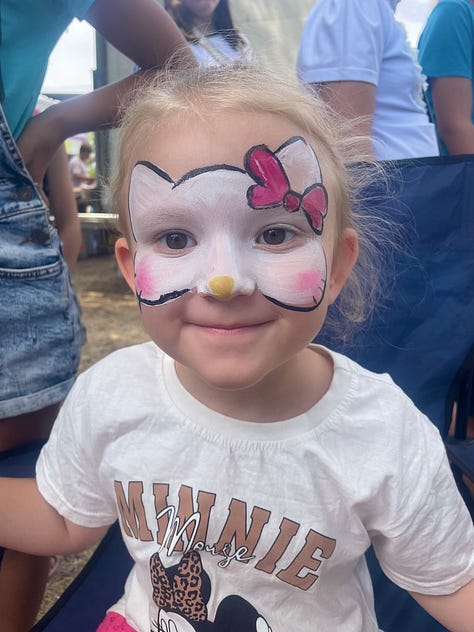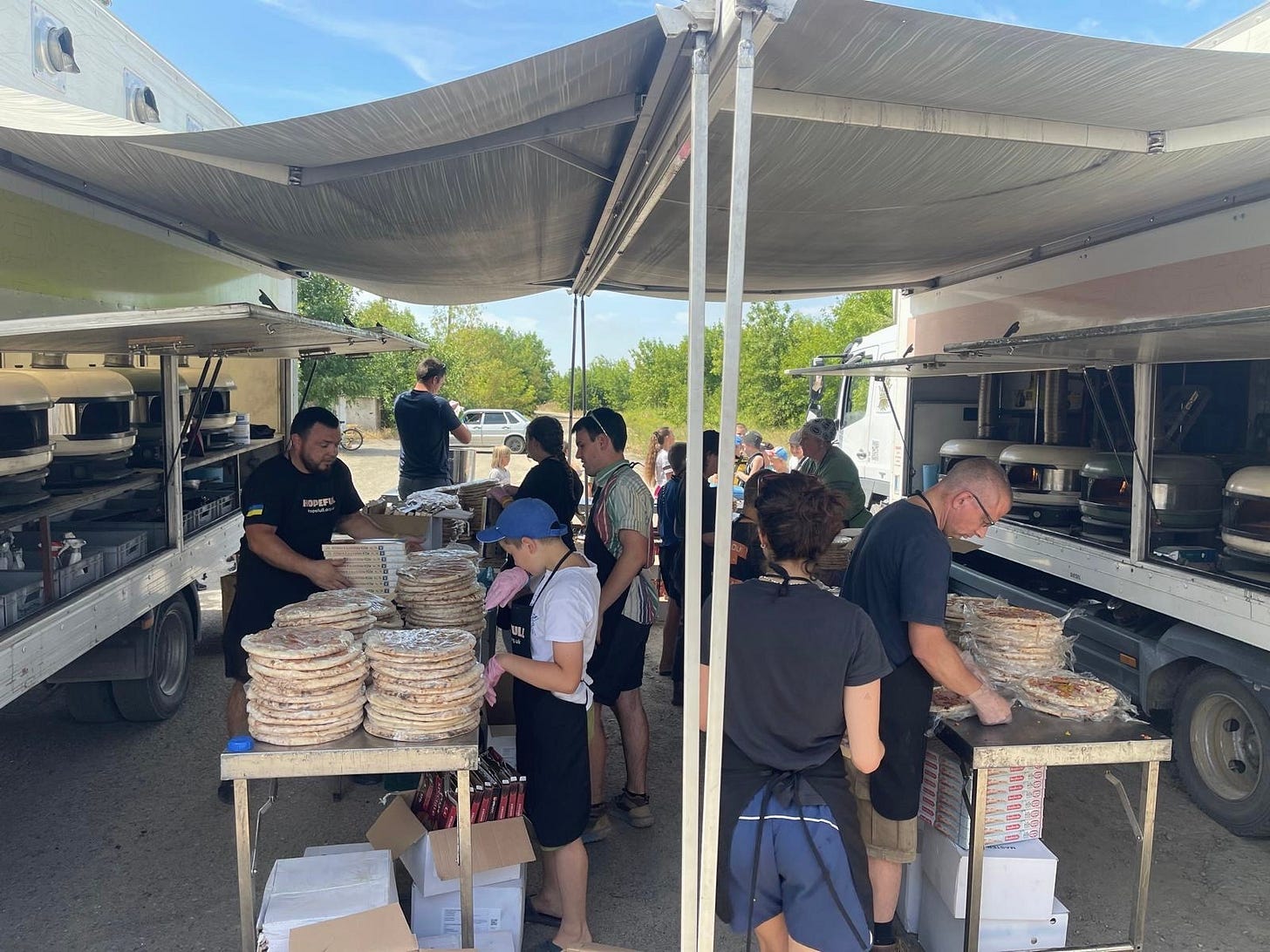Trying on a brighter day; a reflection on face painting in Ukraine.
Finding the words to describe an experience simultaneously so comforting and disquieting is tricky.
Last summer, I spent three weeks volunteering with HopeFull. With exceptional grit, dedication and compassion, the charity’s volunteers have delivered pizzas to soldiers, displaced peoples and previously Russian-occupied villages across Ukraine since the onset of the war over two and a half years ago. I stayed predominantly with the Eastern team, which at the time was based in Mykolaiv, a city invaded by Russia in February 2022 but since reclaimed by the Ukrainian military.
Every day, we would wake up early, drive up to four hours through mine-lined roads, set up our stations, and serve between one and four thousand pizzas to the villagers. We would organise a juice stand, music and dancing, and for one week, we even had two popular Ukrainian singers touring with us.
My job was to paint the children’s faces.
I regret to admit my career faced a tumultuous start. On my first day, having plonked myself down cluelessly in the artist’s chair, I found myself face-to-face with a young girl and her father. Though only about nine, it’s clear to me now that she could tell I didn’t have a clue what I was doing. After trying and failing to paint what I think was a butterfly – although I don’t remember the attempt fondly – she reservedly agreed that we should just stick to a simple Ukrainian flag. That seemingly simple blue and yellow rectangle proved to be another disaster, and I had to expunge her face yet again from my brightly coloured blunder with a series of face wipes before she stole off to her dad with a tear in her eye.
I was also on the brink of crying. Letting down children when they’re expecting something magical is always a slightly crippling experience, but under the circumstances, I felt like a true idiot. In fact, she was much more composed than me in that situation, which speaks volumes to the resilience of the Ukrainian people in general.
Luckily, my craft improved quickly, and so ebbed the general consensus that my brushwork should be avoided at all costs. Soon, tigers, rockets, skeletons, rainbows, Spidermen, zebras, and Pikachus were hopping off the foldable camper chair and chomping on slices of pepperoni. Older kids would sometimes chat with me through Google Translate or practice their (impressive) English. I would paint flags of Ukraine or our home countries on my fellow volunteers’ cheeks as signs of solidarity. Meanwhile, enthusiastic mums pulled up their toddlers’ favourite cartoon characters for me to copy so little Hello Kitties could pose under the tree shade with jagged grins.



Unfortunately, I have to check myself before romanticising these memories as well as my own impact as a volunteer. It was not uncommon for kids to be overwhelmed, silent, or unsure. Not every child is indeed naturally gregarious, but I had to remember that, in reality, I was still a strange person from a strange place, coming to them in a strange time. There’s something perverse about painting a butterfly sitting ten metres away from missile remains or pro-Russian ‘zwaztikas’ on nearby walls.
I tried very hard to make each design perfect, something they could be proud to show their loved ones. Being able to paint something that brought such joy to little faces was a remarkable experience and honour, but also something that, in many ways, shouldn’t be so. Face painting, pizza and dancing should be a rite of passage for children – something to indulge in, not a distraction.
Finding the words to describe an experience simultaneously so comforting and disquieting is tricky. At such a young age, these children have had to battle against destruction and loss beyond the imagination of many of us. Over my time there, I was told gruelling stories, many first-hand, of violence, torture and rape of village civilians by the Russian army during the occupation. And as the frontline continues to waver, so does the fear of repetition.
Face painting sounds can quickly sound like a trivial activity in the grand scheme of war. In reality, I think it gives a child a moment to say: I want to be a tiger today because I am fierce, or, I’m going to be a unicorn with a golden horn because I am magical and I can. There’s something important in that autonomy.
I didn’t expect to be painting faces when I shuffled onto the coach from Krakow to Lviv, but I’m glad I did. These children helped me witness first-hand the transformative potential of art: to create moments of respite in the face of suffering, to paint a better day with brighter colours.

Note:
HopeFull and its volunteers are truly fantastic, every day delivering pizza, fun, and solidarity to people all across Ukraine. The resilience of the team leaders to push on no matter what’s thrown at them and always put the Ukrainian people first deserves commendation and support; they are wonderful humans. Please check out their Instagram, Facebook or website to look further into the amazing work they are doing, and support them by donating here.




